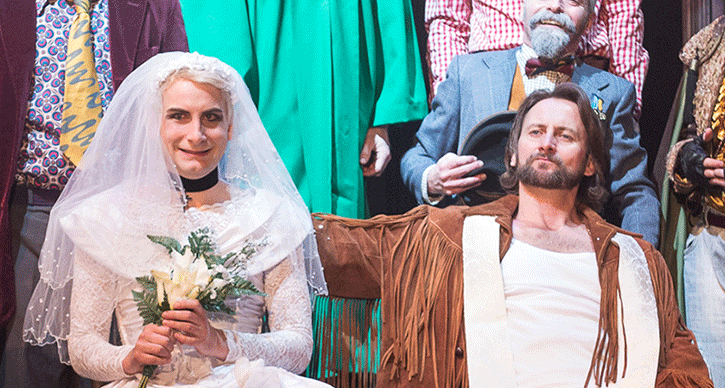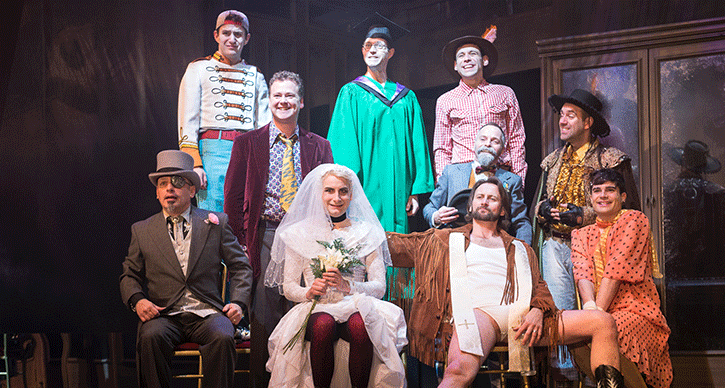Propeller Blog: The Actor’s Freedom
Editor’s Note: Propeller performs Twelfth Night and The Taming of the Shrew in Ann Arbor, February 20-23. Leslie Stainton covered the company’s last visit to Ann Arbor in 2011 with Richard III. This post is a part of a series.

Photo: The Taming of The Shrew. Photo by Manuel Harlan.
I’ll confess up front I’d never seen Taming of the Shrew before. Never even read it. I had some gauzy idea—probably from Kiss Me Kate—that it was a happily-ever-after story about an ideally matched couple who couldn’t figure out they were meant for each other until they’d sparred around for two hours and wound up kissing.
I now know—or suspect—the reason I didn’t know the show is because it doesn’t get done all that much. And that’s because, like Merchant of Venice, it deals with things that make us very, very, very uncomfortable.
One of the first questions asked at the post-show Q&A last night: “Was it a comedy tonight?”
Answer, from a cast member: “The funniest thing about it is how stupid the men in the play are.”
In a book I return to regularly, The Actor’s Freedom, critic Michael Goldman argues that one reason we need theater is because of the actor’s freedom to handle “fearful materials…While on stage, the actor enjoys a kind of omnipotence, a privilege and protection not unlike that accorded sacred beings—whatever he is doing, whatever crimes he may appear to commit, he is not to be interfered with.”
You see Goldman’s idea played out to magnificent effect in this bracing, brutal show about domestic violence, staged as a play within a play—a merciful choice, as it turns out, because it releases us from what would otherwise be unbearable. (I dare anyone to smile at the show’s climactic image of Kate, as broken dog.)
Not that Propeller’s Shrew doesn’t have its moments of wild comedy or brilliant color or hip-thrusting ’70s tunes. But my guess is that’s not the part you’ll remember most. In the same week we marked the 50th anniversary of Betty Friedan’s Feminine Mystique, this production reminds us that Kate’s experience of spousal abuse is neither unique nor obsolete—as a number of cast members pointed out after last night’s show. Here’s Benjamin O’Mahoney (Grumio and Pedant) [start at 4:25 for related comment]:
Last night, as I watched actors play characters who were in turn playing characters, I realized again how vital this process is if we’re to confront and understand our basest selves. Identity is the “covert theme of drama,” Michael Goldman suggests. The fact that with Propeller, you’re seeing actors who played someone entirely different the night before only deepens the experience.
It’s a rare pleasure to see actors in rep like this, and to remember that this is how the theater once worked. Companies spent months on the road, traveling from town to town (we’ve got an old road house down the road from us in Adrian), switching roles nightly or sometimes twice in a day, layering roles upon roles. A huge nod of gratitude to Propeller for reviving the tradition and reminding us of the theater’s liberating powers.
Back in Town, and Loving It
Editor’s Note: Propeller performs Twelfth Night and The Taming of the Shrew in Ann Arbor, February 20-23. Leslie Stainton covered the company’s last visit to Ann Arbor in 2011 with Richard III. In this interview, Leslie chats with Propeller’s executive producer Caro McKay.

Photo: The Taming of The Shrew. Photo by Manual Harlan.
Caro McKay has been around the theater long enough to call herself “a dinosaur.” Now the executive producer of Propeller, she managed the English-language tour of the Peter Brook’s iconic Mahabarata back in the 1980s—a production students now learn about in performance studies classes, as McKay discovered to her surprise when she visited a class in U-M’s School of Music, Theatre, and Dance yesterday.
McKay’s been to Ann Arbor twice before—first with the venerable Royal Shakespeare Company nearly a decade ago, and then in 2011 with Propeller, the rambunctious, unpredictable, musically minded all-male troupe she launched a few years ago with the director Edward Hall. They’re all back in A2 this week with a pair of Shakespeare plays McKay says complement one another in dizzying ways—“because one is so harsh on love and marriage, and the other is so life-affirming about it.”
While crews were unpacking sets and focusing lights in the Power Center late yesterday afternoon, McKay took time to field a few questions by phone from her hotel room.
Leslie Stainton: What’s the best part about coming back to Ann Arbor?
Caro McKay: It’s the people. It really is. UMS is a fantastic host. And we’ve thoroughly enjoyed playing to the audiences. American audiences are very vocal. You let us know if you find it amusing or shocking. You tell us, and English audiences are rather restrained. It’s such a joy to have that interaction.
LS: What’s especially challenging about these two shows, Twelfth Night and Taming of the Shrew?
CM: Shrew is very funny but also very painful—there are very few kind words in that show. It’s the shorter, tighter, harsher of the two plays. For me it just passes in a moment, really. It’s riveting. And to follow up with Twelfth Night, which is a beautifully balanced bit of love with melancholy and humor—and also its own viciousness.
LS: Anything in particular we should be looking for in either play?
CM: Both shows are full of music. That’s very particular to Propeller, the way the actors are active musicians. I think there will be a lot for people to enjoy. I should just say very quietly that Act Two of Twelfth Night starts with a little bit of a tap dance routine.
LS: What about the sets?
CM: This time we’ve come back with a set that is shared between both productions, using wardrobes that you can walk into, out of, swing around. One wardrobe opens and has an organ. There’s an enormous great chandelier that is used in both plays. Twelfth Night can be quite black and white when we start in the beginning, in court, in this rather miserable little place … and then the color comes into it through the play.
LS: Are there certain moments where you’re especially curious to see how audiences react?
CM: I’m wondering how they will respond to the wedding in Shrew. So we’ll just wait and see what comments that might bring in. And to Petruchio and his servant. And I think the audience for Twelfth Night will enjoy the box tree scene—when Malvolio gets the letter to read. I think that is done in a rather different way. I’m very much looking forward to the comments. It was a rather lively debate last time.
What’s next in the Propeller pipeline?
CM: Our next two shows are Midsummer Night’s Dream and The Comedy of Errors. Popular titles. We’re building our audiences. Because a year after that, from the autumn of 2014 to 2015 we’re going to produce our history cycle. So we’re consolidating audiences, and then we’re going to sock ’em with a whole load of history. (Laughs.) Five plays, and we’ve decided that our version of the history cycle will include Edward III, which is attributed to Shakespeare.
LS: Any chance we’ll get to see it in Ann Arbor?
CM: We’d be so proud to. But I’m very very aware that Ann Arbor has had the RSC history plays! We would be only too proud—we love coming here already.


